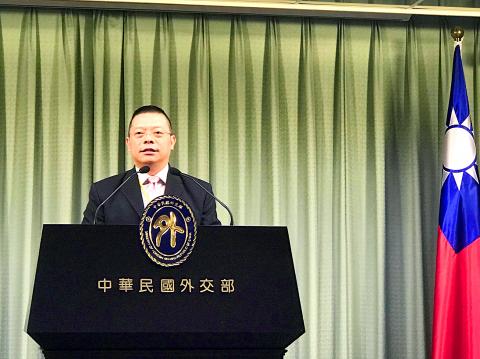The Japanese government welcomes all countries, including Taiwan, that can accept the principles and standards of a Japanese-led international economic bloc and has called on Taipei to solicit support to join the Comprehensive and Progressive Agreement for Trans-Pacific Partnership (CPTPP), a Taiwanese diplomat said yesterday.
The government has confirmed Tokyo’s official stance of welcoming Taipei’s bid to join the CPTPP, Taiwan-Japan Relations Association Deputy Secretary-General Hsieh Bor-huei (謝柏輝) told a news briefing.
It has always been Japan’s stance that such a trade deal would be open to countries or regions that accept its principles and are willing to meet its standards, Hsieh added.

Photo: Peng Wan-hsin, Taipei Times
Japan also suggested that Taiwan should solicit support from more CPTPP members, because the trade group operates by consensus, he said.
A previous comment made by Japanese Minister of Foreign Affairs Taro Kono, who said that Taiwan’s decision to maintain a ban on Japanese food products from areas affected by the Fukushima Dai-ichi nuclear power plant disaster might hamper Taipei’s bid to join the CPTPP, was made in response to media inquires and might only reflect his personal view, Hsieh said.
On Nov. 24 last year, 78 percent of Taiwanese voters cast ballots in favor of the ban.
Asked about Tokyo’s stance regarding the result during a Dec. 7 news conference, Kono expressed disappointment and said that his government would consider filing a complaint with the WTO.
Hsieh said that Taiwan has been trying to amend ties with Japan since the referendum.
Taiwan is considering learning from the US and the EU, which screen certain food products imported from Japan’s nuclear disaster-affected areas to ensure they are safe to eat, instead of banning them altogether, he said.
“In this way, we can make sure the health of Taiwanese is protected, while at the same time staying in line with international standards when dealing with food safety issues,” he said.
The CPTPP last month agreed to expand its membership during its first commission meeting in Tokyo.
Participating countries in a joint ministerial statement highlighted the importance of expanding the agreement by taking in new members to form a stronger united front against the rise of protectionism.
CPTPP member countries understand that Taiwan is interested in joining the trade bloc, and the government would continue to communicate with them and seek their support, the Ministry of Foreign Affairs said in a statement.
The CPTPP came into being after US President Donald Trump pulled out of the Trans-Pacific Partnership in January 2017.
The other 11 Trans-Pacific Partnership countries — Canada, Australia, Brunei, Chile, Japan, Malaysia, Mexico, New Zealand, Peru, Singapore and Vietnam — renegotiated the free-trade deal and signed it in March last year.

ALIGNED THINKING: Taiwan and Japan have a mutual interest in trade, culture and engineering, and can work together for stability, Cho Jung-tai said Taiwan and Japan are two like-minded countries willing to work together to form a “safety barrier” in the Indo-Pacific region, Premier Cho Jung-tai (卓榮泰) yesterday said at the opening ceremony of the 35th Taiwan-Japan Modern Engineering and Technology Symposium in Taipei. Taiwan and Japan are close geographically and closer emotionally, he added. Citing the overflowing of a barrier lake in the Mataian River (馬太鞍溪) in September, Cho said the submersible water level sensors given by Japan during the disaster helped Taiwan monitor the lake’s water levels more accurately. Japan also provided a lot of vaccines early in the outbreak of the COVID-19 pandemic,

Kaohsiung Mayor Chen Chi-mai (陳其邁) on Monday announced light shows and themed traffic lights to welcome fans of South Korean pop group Twice to the port city. The group is to play Kaohsiung on Saturday as part of its “This Is For” world tour. It would be the group’s first performance in Taiwan since its debut 10 years ago. The all-female group consists of five South Koreans, three Japanese and Tainan’s Chou Tzu-yu (周子瑜), the first Taiwan-born and raised member of a South Korean girl group. To promote the group’s arrival, the city has been holding a series of events, including a pop-up

TEMPORAL/SPIRITUAL: Beijing’s claim that the next Buddhist leader must come from China is a heavy-handed political maneuver that will fall flat-faced, experts said China’s requirement that the Dalai Lama’s reincarnation to be born in China and approved by Beijing has drawn criticism, with experts at a forum in Taipei yesterday saying that if Beijing were to put forth its own Dalai Lama, the person would not be recognized by the Tibetan Buddhist community. The experts made a remarks at the two-day forum hosted by the Tibet Religious Foundation of His Holiness the Dalai Lama titled: “The Snow Land Forum: Finding Common Ground on Tibet.” China says it has the right to determine the Dalai Lama’s reincarnation, as it claims sovereignty over Tibet since ancient times,

Temperatures in some parts of Taiwan are expected to fall sharply to lows of 15°C later this week as seasonal northeasterly winds strengthen, the Central Weather Administration (CWA) said today. It is to be the strongest cold wave to affect northern Taiwan this autumn, while Chiayi County in the southwest and some parts of central Taiwan are likely to also see lower temperatures due to radiational cooling, which occurs under conditions of clear skies, light winds and dry weather, the CWA said. Across Taiwan, temperatures are to fall gradually this week, dropping to 15°C to 16°C in the early hours of Wednesday